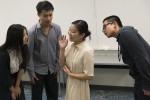With their expressions stoic, four students stand side-by-side on the dim stage. Stage lights illuminate their faces as they repeatedly utter, one by one, two distinct phrases: “This is the Soviet Union in 1983. This is not Los Angeles in 2014.”
A stumble in wording breaks the trance – the actors state: “This is not the Soviet Union in 1983.”
This twist in words opens the play “Dear Sophia” with illusion and deception – two main components of the play.
The Chinese Fantasy Theatre Group strives to connect cultures in the adaptation of the Russian play “Dorogaya Yelena Sergeevna,” which takes place in the Soviet Union in the 1980s. The theater group’s fall production, “Dear Sophia,” will premiere Friday in Schoenberg Hall. Though the play will be performed in Mandarin, projectors on either side of the stage will provide the audience with English subtitles.
In the play, four high school graduates visit their math teacher, Ms. Sophia, on her birthday, showering her with gifts and praise. But Ms. Sophia soon finds out that her students’ intentions are not sincere. In reality, the students are trying to manipulate her into giving them the key to the safety box where their last math exams are kept so they can replace their ungraded tests with new ones with the correct answers.
Yijing Lin, a third-year computational mathematics student and the director of “Dear Sophia,” said that the play takes place over one single scene. The short time frame adds to the intensity of the play, highlighting the tension and impulsive decisions.
“It works very well for me (as the director),” said Lin, who is also minoring in theater. “The story has to happen in a closed space (to show) the five people trapped in this inescapable situation.”
The leader among the four students, Luca, has a different motive. Luca, played by third-year USC undeclared student He Zhang, does not need his exam score replaced; his main incentive in this scheme is to practice manipulation and deception, said Zhang.
“He just wants to show that he has the ability to conquer this teacher,” said Lin. “He wants to be invincible.”
Like Zhang, Chinese Fantasy Theatre Group members, non-members and those outside the UCLA community can take part in the CFan Theatre Group’s performances. For some of the actors, this will be their first exposure to the stage.
Zhang said he heard about the production from a friend who was involved in CFan, and posted information about it online. This is Zhang’s first time participating in a school production – Zhang said he wanted to dabble in theater and saw this as an opportunity to do so.
For Lin, this is her first time directing a play. Lin said that, while exhausting, it has been a growing experience.
“In the past, I have always been the one being directed (so) it’s a whole different story to direct.” said Lin. “I have to see the stage as a complete picture instead of only seeing (my) individual performance as I used to do as an actress.”
At the end of spring quarter, more than 60 people auditioned for the fall production. Because there are only five roles, Lin said, the selection process was very competitive.
“Sometimes to be an actor, you’re going to need some luck to encounter a role you really like, a role that’s just right for you,” said Allison Jia, a third-year chemistry student and the actress who plays Ms. Sophia.
Jia is not a member of the CFan Theatre Group but has experience acting in high school. After finding out last quarter that CFan was going to perform “Dear Sophia,” Jia said she was intrigued.
“I read the original script (for “Dorogaya Yelena Sergeevna”),” Jia said. “I just thought, ‘This is it.'”
Jia said she was drawn to the character of Ms. Sophia because the character’s idealistic vision of the world is something not often seen today’s society.
“(Ms. Sophia’s) world is black and white … She is an idealist and … really sticks to what she believes,” Jia said. “The pivot point (is when) the students overturn all her world views. They show her the world is not what she thinks it is … the world is dirty.”
Because each character in the play is very unique, Lin said the casting process involved searching for actors that understood the characters’ distinct personality traits and conveyed that understanding in their performances.
“In a way, (Ms. Sophia) is being self-deceptive the whole time.” Lin said. “Her students … represent the dark side of the times. They are really explicitly telling her that it isn’t like this, and you have to accept it – that’s where the theatricality really comes in.”
